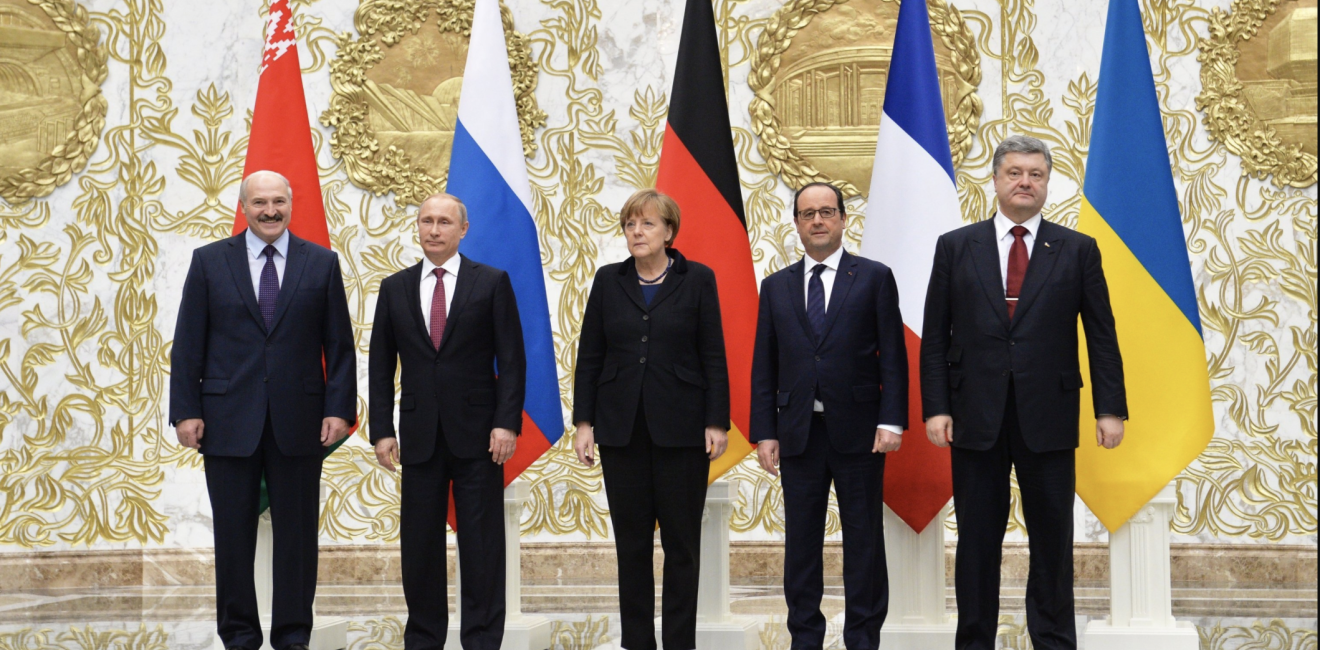
A blog of the Kennan Institute
BY WILLIAM E. POMERANZ
The accusations continue to fly between the United States and Russia. The United States alleges Russia is preparing for a large-scale invasion of Ukraine, with potential casualties of 50,000 people and millions of refugees. Meanwhile, Russia accuses the United States of being hysterical and goading Ukraine into starting a war, while simultaneously denying any plans to invade.
Among all the charges and countercharges, there is only one thing that both sides apparently agree on. On February 3, State Department spokesperson Ned Price said that the United States supports the implementation of the Minsk accords. This declaration echoed previous statements from Kremlin spokesman Dmitrii Peskov, who also has called for the full enactment of the Minsk accords.
Yet the most recent January 2022 meeting of the various parties to the Minsk accords produced no discernible results or movement. This is largely due to the origins of the agreement. Signed under duress on February 12, 2015, at the height of Russia’s invasion, the Minsk Protocol, later known as Minsk I, introduced an imperfect ceasefire that may have prevented a march on Kyiv but never stopped the fighting—and the dying—of Ukrainian soldiers and civilians. Conspicuous, however, were the signatories to the accord. Leonid Kuchma, the second president of Ukraine, signed for his country, while the Russian side was represented by its ambassador to Ukraine, M. Y. Zurabov. The representatives of Donetsk and Luhansk oblasts also attached their signatures to the accords, but neither Vladimir Putin nor the newly elected Ukrainian president Petro Poroshenko signed the agreement. The United States was also not a party to the Minsk accords; instead, a working group (in the Normandy Format) was formed, whose members included representatives of Russia, Ukraine, Germany, and France.
For Ukraine, the accords represent a national humiliation and, if implemented, would require a fundamental rewriting of the country’s founding law. The 1996 constitution established Ukraine as a unitary state with a highly centralized form of government. Ukraine embarked on a significant decentralization policy in the aftermath of the 2014 Revolution of Dignity, but the Minsk accords call on Kyiv not only to recognize the independence of Donetsk and Luhansk within the country but also to give these two regions veto power over any national legislation. Such authority would mean that Russia could effectively gain control over Ukraine’s internal politics. It would also require significant constitutional amendments that no national Ukrainian politician would want to put his or her name to.
The Minsk accords contain other bitter pills as well. The agreement calls for elections in the two breakaway regions in accordance with Ukrainian law, but it remains unclear as to how Ukraine would enforce these rules since it does not control this territory. The agreement also calls for the pardon and amnesty of all the participants in the rebellion in Donetsk and Luhansk.
The Minsk agreement includes some difficult choices for Russia as well (though Russia is not specifically named in the accords as a party to the conflict), but there is no indication that Russia will follow through on its promises. Specifically, Russia shows no sign that it intends to grant Ukraine control over all of the latter’s border with Russia, as required by Minsk II, or that it plans to withdraw any of its weapons and other military equipment from the region. Moreover, it clearly has no intention of returning Crimea to Ukraine. Indeed, the 2020 amendments to the Russian constitution state that Russia cannot relinquish any of its territory, which means that any deal involving Crimea (or the Kuril Islands, near Japan, for that matter) is permanently off the table.
So while the Minsk agreements define a theoretical process for resolving the conflict, all of the major concessions would be assumed by Ukraine, most notably the sacrifice of its sovereignty and its future existence as an integrated, unified state. Thus the United States is sending mixed signals when it calls for implementation of the Minsk accords while still standing firm on Ukraine’s right to defend its territorial integrity. In reality, you cannot have both.
Russia’s commitment to the Minsk accords is wavering as well. Legislation has been proposed in the Duma calling on President Putin to recognize the self-styled Donetsk People’s Republic and the Luhansk People’s Republic as independent, sovereign states. The draft legislation further calls on Russia to create a basis for mutual relations and assistance, including guarantees for security.
The vote on this legislation has temporarily been deferred, but if approved, it would mean the end of the Minsk process (and the ratification of two more frozen conflicts that Russia will have to pick up the tab for). Of course, any invasion by Russia of Ukraine would render the Minsk agreements null and void as well.
The EU, NATO, and the United States are still trying to find a way to give diplomacy a chance and forestall a catastrophic war. Thus, despite pronouncements from Russia and the United States swearing fealty to the Minsk process, the conditions set out in the Minsk agreements are no longer conducive to resolving the crisis. Instead, all parties must return to the drawing table—this time including all the main players on both sides—to find a creative, if narrower, solution with the two overriding goals of preventing war and keeping Ukraine’s sovereignty intact.
The opinions expressed in this article are those solely of the authors and do not reflect the views of the Kennan Institute.
Author


Kennan Institute
After more than 50 years as a vital part of the Wilson Center legacy, the Kennan Institute has become an independent think tank. You can find the current website for the Kennan Institute at kennaninstitute.org. Please look for future announcements about partnership activities between the Wilson Center and the Kennan Institute at Wilson Center Press Room. The Wilson Center is proud of its historic connection to the Kennan Institute and looks forward to supporting its activities as an independent center of knowledge. The Kennan Institute is committed to improving American understanding of Russia, Ukraine, Central Asia, the South Caucasus, and the surrounding region through research and exchange. Read more

Explore More in Focus Ukraine
Browse Focus Ukraine
Talking to the Dead to Heal the Living

Ukrainian Issue in Polish Elections


